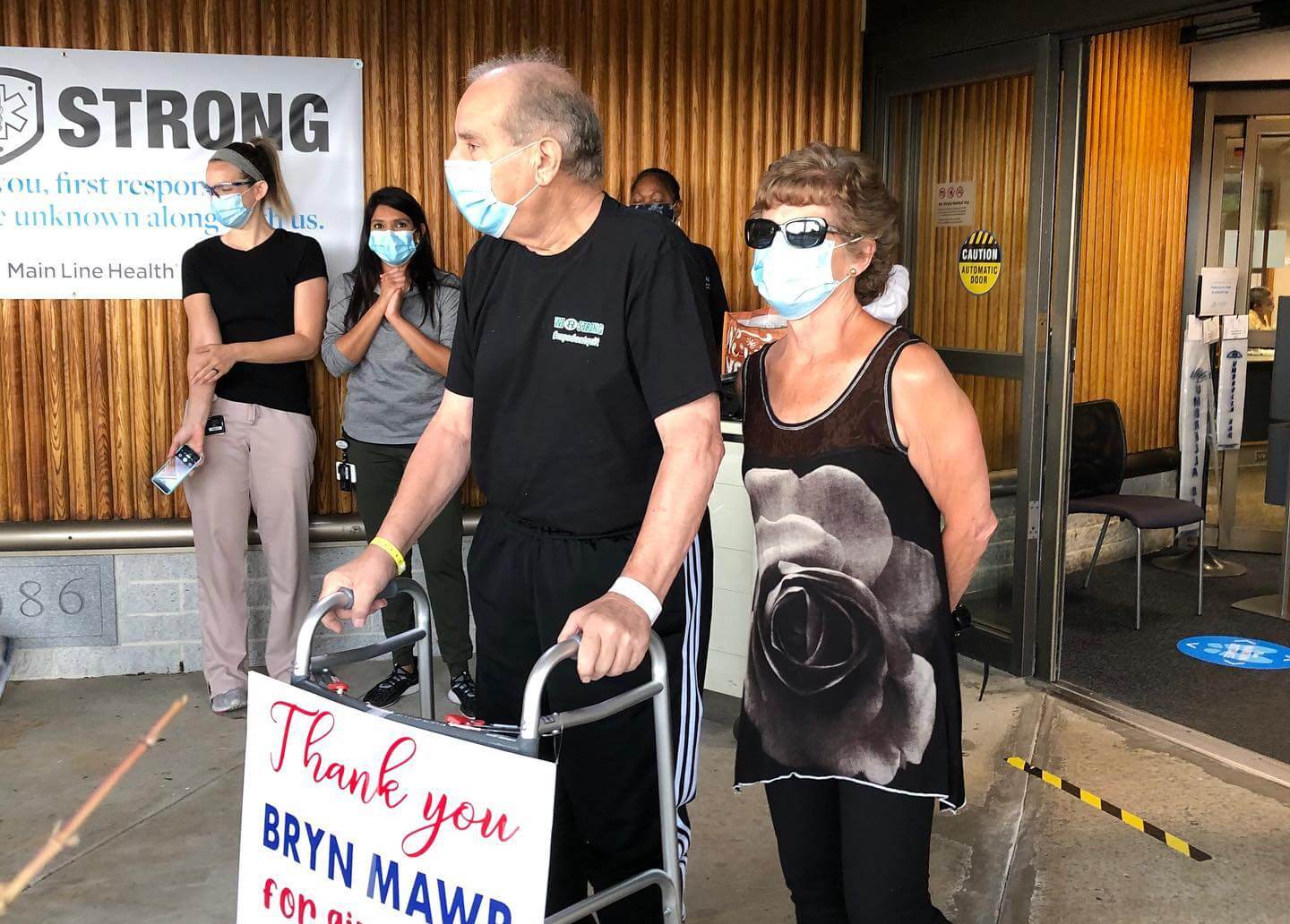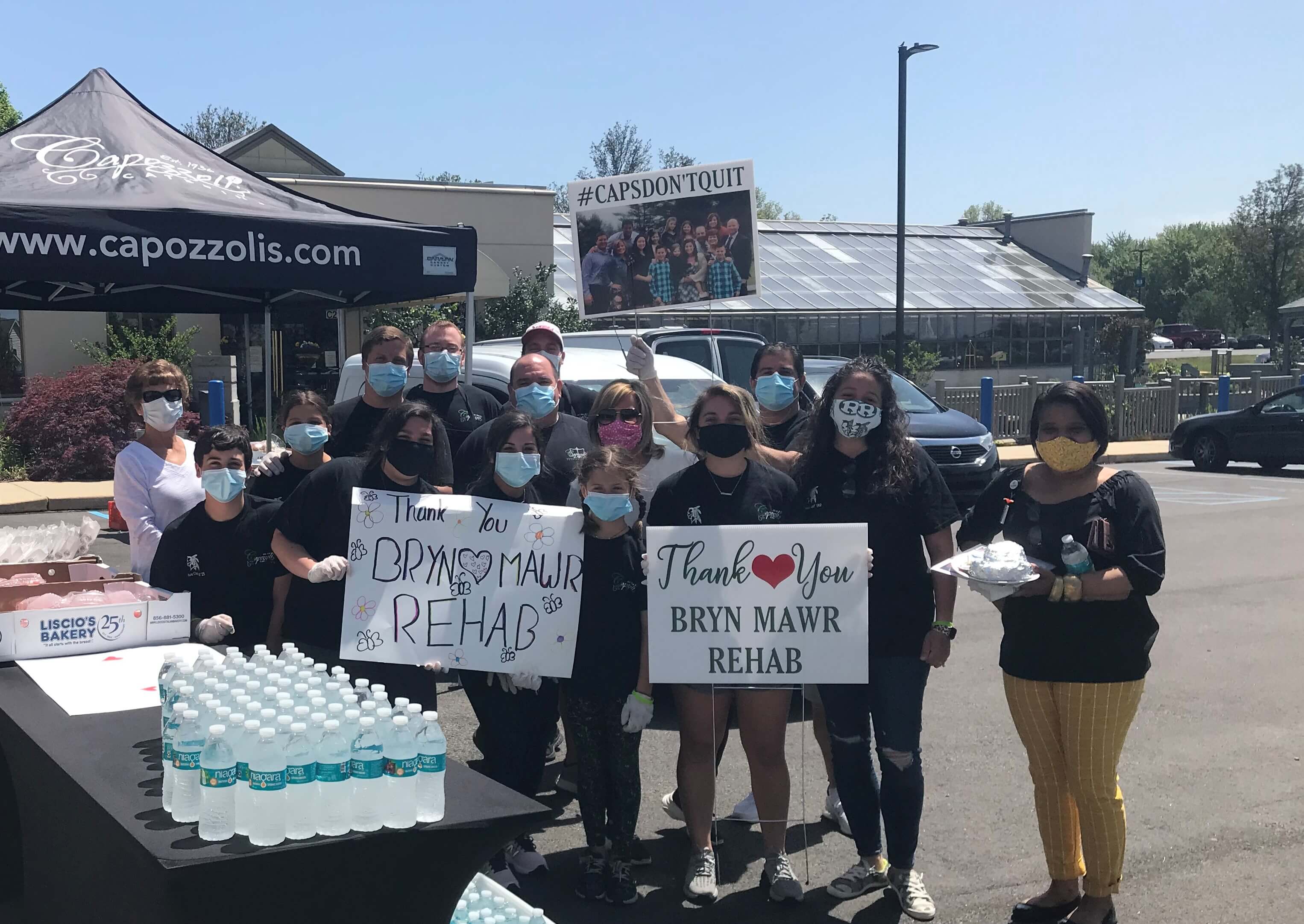Finding new strength: Beating the odds after COVID-19
"I was overcome with emotion when I saw so many amazing people from my care team clapping for me as I was discharged from Bryn Mawr Rehab Hospital," shares 72-year old Mike Capozzoli.
With the theme song to Rocky playing in the background, Capozzoli was reunited with his family after a long-term COVID-19 battle. Just like the title character in the movie, Capozzoli overcame the odds. It was the care he received at Bryn Mawr Rehab Hospital that made it happen.

Long-term COVID, from the ICU to rehab
Capozzoli first received emergency care services for COVID-19 at a local hospital on March 27, 2020.
"Mike got sick in the very early days of the pandemic. I had to drop him off at the front door of the emergency room because I wasn't allowed to go inside. It was devastating," says Capozzoli's wife, Eileen.
Eileen, also sick with COVID-19 but able to recover at home, had to remain in isolation while her husband fought for his life. Capozzoli was transferred to an acute care facility where he was intubated for more than two weeks. When he finally awoke, he was so weak he couldn't even lift up a piece of paper.
"I couldn't do anything for myself—I couldn't feed myself, dress myself, or even sit up on my own. I didn't think I would ever get better," he says.
Long-term COVID recovery journey begins at Bryn Mawr Rehab
On April 27, one month to the day after first being admitted to the hospital with COVID-19, Capozzoli was transferred to Bryn Mawr Rehab Hospital to continue his recovery. For the first week, he was in isolation on the COVID recovery floor.
When the pandemic first began in 2020, COVID-19 patients like Capozzoli had to be placed in isolation, and access to therapy was limited to in-room sessions with therapists in full PPE. Today, Bryn Mawr Rehab Hospital continues to implement all required COVID-19 protocols and has evolved its programs to create a rehab unit designed specifically for COVID-19 patients. This unit allows patients to access therapies and special equipment in a larger space outside of their rooms while keeping other patients and staff safe.
"Bryn Mawr Rehab's multidisciplinary approach to care is more important than ever before as our team continues to develop innovative solutions to ensure superior patient care and keep patients, their families, and our staff safe.
Throughout the pandemic, our goal has been and will remain to get our patients back to living their lives," says Mithra Maneyapanda, MD, medical director of Bryn Mawr Rehab Hospital's brain injury program.
Trusting the COVID recovery process
Capozzoli underwent physical, occupational and recreational therapy to help regain his physical and emotional strength. After a few weeks of hard work, he earned a "wheelchair license" and was allowed to take himself to his therapy sessions and regain some independence by spending time outside on the hospital's expansive grounds. But Capozzoli still had more work to do before he was ready for discharge.
"I would often get frustrated because I felt like my recovery wasn't happening fast enough, especially because I couldn't see my family. That's when my therapists would step in and remind me that recovery is a process and that rest is just as important as my therapy sessions," he says.
Bryn Mawr Rehab Hospital considers patient families to be an essential part of the care team. But because of COVID-19, families were not able to have the same in-person involvement that would typically be part of a recovery program.
"Normally, the family would be on-site, learning about patients' therapies and how to recover at home. With COVID, we couldn't do most of those sessions in person and had to rely on video conference calls," says Eric Bull, MS, OTR/L, DRS, CDI.
To overcome this hurdle, Capozolli's family shared photos of his home to help his care team determine what equipment and therapy techniques would work best for his home recovery.

Home at last after long-term COVID
After almost two months as an inpatient, Capozzoli was understandably eager to get home.
"I had an amazing experience at Bryn Mawr Rehab Hospital, but I was ready to be with my family. Plus, I felt guilty taking up a bed that could go to someone else who might need it more than me," Capozolli says.
"For Mike, it was more important to his psychological well-being to be together with his family and continue his recovery with them. Ultimately, he achieved independence following discharge," Bull says.

But before he left, Capozzoli and his family had to share their gratitude with the Bryn Mawr Rehab team the best way they knew how—through food. As co-owner of his family's 80-year-old catering business, Capozzoli Catering, the Capozzoli family provided lunch for more than 300 team members.
"I can't say enough good things about my team at Bryn Mawr Rehab Hospital. They truly became my second family. I tear up every time I think about them, from the kind and attentive nursing staff to my physicians and therapists, I wouldn't be alive today without them," Capozzoli says.
On June 3, 2020—68 days after he was first admitted to the emergency room with COVID-19—Capozzoli was discharged. He attended outpatient therapy until August 2020, when he was officially released from outpatient care.
"I left using a cane and transitioned to a leg brace by August. Today, I am back to doing what I love, spending time with family, cooking, and every once in a while, I am even back on the golf course."